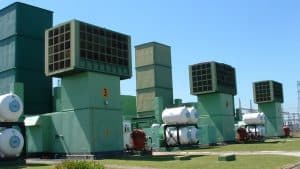
South Africa’s electricity public utility Eskom has picked South Korea-based electrical equipment manufacturer Hyosung Heavy Industries and China-based power transmission equipment manufacturer Pinggao Group as preferred bidders for the design, supply and installation of the utility’s flagship Battery Energy Storage System (BESS) project.
The contract entails installation of 199MW of battery storage capacity with four hours of storage, equivalent to 833MWh of distributed battery storage plants at eight of Eskom’s distribution substation sites. The contract also includes approximately 2MW of solar photovoltaic capacity, as well as operations and maintenance of the BESS facility.
Eskom, which is contributing 13% of the estimated $479.67 million overall project costs to the two-phase 500MW BESS project, says the installation of additional storage is intended to address South Africa’s long-running electricity load-shedding crisis.
The entire BESS project has been designed to utilize large-scale utility batteries with the capacity of 1,440MWh per day and a 60MW solar PV capacity to be implemented in two phases.
The first phase of the project will be commissioned by the end of June 2023.
“The Eskom BESS project will act as a proof of concept on the delivery of the first battery energy storage project in South Africa,” Eskom said in a statement in July.
Eskom said it wants to use the project “primarily for national peak shaving (managing demand) purposes for four hours a day for at least 250 days of the year and will also be used secondarily for ancillary services and local network support.”
During the operational phase, the charging of the batteries will take place during off-peak periods or when the network conditions permit according to Eskom.
The World Bank is providing $320 million for the first phase while the New Development Bank and Eskom will contribute $90 million and $12 million respectively.
The total financing by the New Development Bank, formerly referred to as the BRICS Development Bank, would be $334 million that partly includes support for phase two of the BESS project.
Eskom, which announced a 2.4% increase in revenue to R204.3 billion (approx. $12.61 billion) in the current year, plans to install 144MW in the second phase of the BESS project that is equivalent to 616MWh at four of its distribution sites and one transmission site. The phase will also include 58MW of solar PV capacity with commissioning set for December 2024.
The BESS project will be sited in remote locations where there is limited access to Eskom’s electricity distribution networks but are still close to the renewable independent power producer plants to ensure maximization of the storage benefits.
“Through the BESS project, Eskom aspires to diversify the existing generation energy mix by pursuing a low carbon future to reduce the impact on the environment,” said Velaphi Ntuli, Eskom’s General Manager Coal & Clean Technology.
Eskom’s BESS project could be Africa’s first large-scale grid connected battery storage initiative. Two other such projects in development on the continent including Senegal’s 60MW Taiba N’Diaye wind farm and 100MW Masen solar park in Morocco that are yet to be connected.
